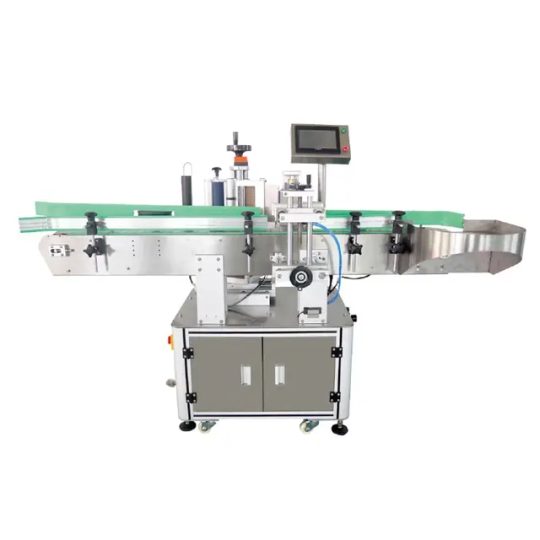#AutomaticLabelingMachinesMarket
Explore tagged Tumblr posts
Text
Automatic Labeling Machine Market Drivers Accelerating Global Demand Across Packaging and Manufacturing Sectors
The automatic labeling machine market is witnessing substantial growth globally, driven by multiple critical factors that are reshaping the packaging and labeling industry. As companies strive for greater efficiency, precision, and compliance, the demand for automatic labeling machines continues to rise across various sectors, including food and beverages, pharmaceuticals, personal care, logistics, and consumer goods. These machines play a pivotal role in ensuring consistent label application, enhancing brand presentation, and meeting regulatory labeling requirements.

Growing Need for Packaging Automation
One of the key drivers of the automatic labeling machine market is the accelerating push toward packaging automation. As industries face rising labor costs, high-volume production requirements, and the need for fast turnaround times, automatic labeling machines offer a reliable solution. They minimize human intervention, reduce error rates, and enhance operational efficiency. Manufacturers are increasingly adopting these machines to streamline processes and maintain competitive advantages.
In modern production environments, speed and precision are critical. Automatic labeling machines can apply labels accurately at high speeds, reducing bottlenecks and improving throughput. Their integration with production lines ensures seamless workflows, contributing to better resource utilization and faster time-to-market.
Increasing Regulatory Compliance and Traceability Needs
Another significant driver is the need for compliance with strict labeling regulations and traceability requirements, especially in the pharmaceutical, food, and chemical industries. Governments and regulatory bodies around the world enforce stringent guidelines for product labeling to ensure consumer safety, proper product identification, and traceability throughout the supply chain.
Automatic labeling machines are equipped with capabilities such as barcode printing, RFID encoding, and serial number generation, enabling manufacturers to meet regulatory mandates effortlessly. These machines support variable data printing, ensuring every product has a unique identifier, which is crucial for quality control, recalls, and inventory management.
Rising Demand from Food and Beverage Industry
The food and beverage industry is a major contributor to the growing demand for automatic labeling machines. With an increasing range of packaged food products, varying packaging formats, and a strong focus on hygiene and safety, automated labeling is becoming essential. Labels provide vital information including ingredients, nutritional values, expiration dates, and allergen warnings.
To meet consumer expectations and comply with local and international regulations, companies in this industry are investing heavily in advanced labeling solutions. Machines designed for wet, dry, and refrigerated environments are gaining popularity, offering durability and accuracy under various production conditions.
Technological Advancements and Smart Labeling Solutions
Technological progress is transforming the labeling landscape. The integration of smart technologies such as sensors, vision inspection systems, and IoT connectivity is enhancing the functionality and intelligence of automatic labeling machines. These systems can detect label placement accuracy, verify printed data, and automatically reject faulty labels, ensuring high product quality.
Moreover, innovations in label material compatibility, machine design flexibility, and modular configurations allow manufacturers to customize their systems for different product types and sizes. Touchscreen interfaces, real-time diagnostics, and remote monitoring are features that add value, reduce downtime, and facilitate easier maintenance.
Surge in E-commerce and Logistics
The explosive growth of e-commerce has led to a heightened need for fast, efficient, and accurate labeling in logistics and distribution centers. Packages require shipping labels, return labels, and barcodes for tracking and delivery accuracy. Automatic labeling machines are crucial for managing this demand and ensuring timely processing of thousands of packages daily.
The logistics sector relies on machines that can handle diverse packaging sizes and apply labels accurately at high speeds. Integration with warehouse management systems enables seamless coordination and real-time updates, supporting efficient operations and customer satisfaction.
Rising Adoption in Emerging Markets
Emerging economies in Asia-Pacific, Latin America, and Africa are experiencing rapid industrialization and urbanization, which has led to an uptick in manufacturing activities and consumer demand for packaged products. As a result, manufacturers in these regions are adopting automated solutions, including labeling machines, to keep pace with global standards and improve competitiveness.
Government initiatives to promote industrial automation, attract foreign investments, and enhance manufacturing capabilities further fuel the demand. Local producers are upgrading from manual or semi-automatic systems to fully automatic labeling machines to scale their operations and meet evolving consumer expectations.
Environmental and Sustainability Considerations
Sustainability is becoming an important factor in the packaging and labeling industry. Manufacturers are under pressure to reduce waste, use eco-friendly materials, and improve energy efficiency. Automatic labeling machines support these goals by minimizing label waste through precise application and supporting recyclable and biodegradable label materials.
Advanced machines are designed to consume less energy and operate with minimal environmental impact. Companies focused on sustainability are turning to automation as a way to align production practices with environmental standards while maintaining high performance.
In conclusion, the automatic labeling machine market is driven by a combination of technological innovation, regulatory pressures, industry-specific needs, and global trends such as e-commerce expansion and sustainability. As businesses continue to prioritize efficiency, accuracy, and compliance, the demand for sophisticated labeling solutions is expected to grow, positioning the market for sustained long-term development.
#AutomaticLabelingMachinesMarket#PackagingAutomation#LabelingSolutions#ManufacturingInnovation#SmartLabeling
0 notes